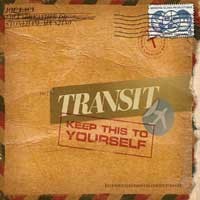Transit's sophomore full-length walks a fine tightrope between mass pop-punk appeal and those who always saw the band as far more talented and ambitious than the confines of that style, scene and aesthetic.
A fair warning: Keep This to Yourself--notably its first half--is far poppier than what previous fans might be accustomed to. It's a move that could certainly find crossover appeal with the fanbases of their associates--Man Overboard; This Time Next Year; I Call Fives--and that's likely read as a scary thing to Transit's followers who always admired them for their more obscure, "roots"-oriented influences (Osker, Fairweather). After all, 2009's Stay Home had those moments where the entire atmosphere could change on a dime, Joe Boynton's voice dipping down into more hushed spheres; it seemed to promise something far more progressive and expansive was to quickly follow.
Keep This to Yourself is not that watershed, life-changing record, but here's the thing: They do the popper thing really well. This may not be the direction I or others wanted Transit to go, but it's a very good pop-punk album on its own merits.
If it's any consolation, all incarnations of "emo" has gone through since 1998 continue to be referenced by the band, from Lifetime's speed ("The Downsides," "Our New Year") and Taking Back Sunday's dynamic vocal trade-offs ("Footwork") to whatever sort of playful, finger-picking bands My Heart to Joy get down to ("No In-Between"). It's just set into a more dastardly melodic complex, albeit one that's delivered with a relentless energy, scrappiness and technicality that's always been at the band's core regardless of how they're going about it. Granted, guitarist Tim Landers has a more limited role here with his backup vocals than he's seemed to have on past records, but he's just as effective when utilized, and he's expanded his range with newfound melodic yelps alongside his trademark gravelly shout.
The record's heavier second half offers a little more experimentation and burliness, from the more swelling beginning of "I Was Going to Cross This Out" to the emo jam-band feel of the instrumental title track. It's actually just as successful in nature as the first half, but its different direction provides a necessary contrast to freshen things up.
But Joe Boynton's lyrical development, which has improved steadily over the years, has reached a level of comparative profoundity as far as pop-punk goes. "You can paint a wall, but you can't cover up the cracks," he cautions in "Footwork," and later muses in "I Was Going to Cross This Out," "Everyone misses someone more than they would like to admit." Hardly groundbreaking, but certainly grounded. He's not always 100% on point, though--in "No In-Between," there's a proverbial boy spoken of whose "bones were made of glass" and "threw too many stones, leaving him in pieces everywhere." So...was the boy throwing stones at himself, then? Or were his joints clashing so much, said glass bones eventually shattered? The metaphor just feels strained. And a personal preference for "Our New Year," where the most heart-aching refrain of the album comes along in a repetitious plead by the band ("Is this the happiest you've ever been? Oh God, I hope that it is."): The bridge and close would be exponentially more cathartic if it was "I hope to God that it is," but that's probably just nitpicking at this point.
Producer Jesse Cannon has been a can't-miss overseer on pop-punk albums the last few years, from Northstar to the Menzingers, but there's one sonic oddity here: The record is awfully trebly, especially on Keep This's poppier front half. It's all vocals and guitars, and while some might argue the mix is just playing to the band's strengths, the barely-there mids and rhythm would have likely added a more firm lower end. It's not completely bothersome, but it is noticeable.
Amid the record's strong theme of communication via the written or verbal word comes a series of hidden phrases in the liner notes. Truth be told, it's an alpha-numeric code that's easily cracked by the key on the CD, and they're all just essentially single lyrics ripped from the songs. That not-so-complex system sums up Keep This to Yourself perfectly: This record isn't nearly as sinuous as it might present itself--or as transcendent as its creators are capable of--but it's hardly a totally transparent effort, either. Call it a record of transition.
STREAM
Please Head North
Footwork
A Living Diary
